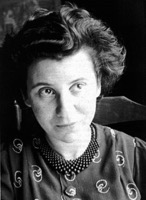Etty Hillesum
Esther "Etty" Hillesum (15 January 1914 – 30 November 1943) was the author of confessional letters and diaries which describe both her religious awakening and the persecutions of Jewish people in Amsterdam during the German occupation. In 1943 she was deported and killed in Auschwitz concentration camp.
Life
Esther (Etty) Hillesum was born on 15 January 1914 in her family home in the town of Middelburg, Hilversum, the oldest of the three children – she had two brothers, Jacob or 'Jaap' (1916–1945) and Michael or 'Mischa' (1920–1944) – of Levi Hillesum (1880–1943) and Riva Bernstein (1881–1943). After completing school she went to Amsterdam to study law, where she met Hendrik (Hans) J. Wegerif with whom she had a relationship that she describes in her diaries.
Etty Hillesum began writing her diary in March 1941 possibly at the suggestion of her analyst Julius Spier, whom she had been attending for a month. Although his patient, Etty also became his secretary and friend and eventually his lover. His influence on her spiritual development is apparent in her diaries; as well as teaching her how to deal with her depressive and egocentric episodes he introduced her to the Bible and St. Augustine and helped her develop a deeper understanding of the work of Rilke and Dostoyevsky.
Her diaries record the increasing anti-Jewish measures imposed by the occupying German army, and the growing uncertainty about the fate of fellow Jews who had been deported by them. As well as forming a record of oppression her diaries describe her spiritual development and deepening faith in God.
When round-ups of Jews intensified in July 1942 she took on administrative duties for the Jewish Council, voluntarily transferring to a department of "Social Welfare for People in Transit" at Westerbork transit camp. She worked there for a month but returned in June 1943, by which time she had refused offers to go into hiding in the belief that her duty was to support others scheduled to be transported from Westerbork to the concentration camps in Poland and Germany. On 5 July 1943 her personnel status was suddenly revoked and she became a camp internee along with her father, mother and brother Mischa.
On 7 September 1943, the family were deported from Westerbork to Auschwitz. Only Jaap Hillesum did not go with them; he arrived in Westerbork after their removal and in February 1944 was sent to Bergen-Belsen, dying shortly after its liberation in April 1945.
Etty Hillesum's parents are recorded as having died on 10 September 1943, suggesting they died in transit or were gassed immediately upon their arrival. Mischa Hillesum remained in Auschwitz until October 1943 when he was moved to the Warsaw Ghetto, where according to Red Cross he died before 31 March 1944. Etty died in Auschwitz on 30 November 1943.
The diaries
Before she left for Westerbork, Etty Hillesum gave her diaries to Maria Tuinzing with the instruction they be passed to Klaas Smelik for publication should she not survive. Attempts to have them published proved fruitless until 1979 when Smelik's son, the director of the Etty Hillesum Research Centre, approached publisher J. G. Gaarlandt. An abridged edition of her diaries appeared in 1981 under the title Het verstoorde leven [An Interrupted Life], followed by a collection of her letters from Westerbork. A complete edition of her letters and diaries was published in Dutch in 1986 and translated into English in 2002.
